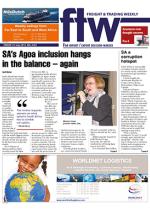South Africa is among eight
corruption hotspots named
in a recent survey undertaken
by maritime legal specialists,
ENSafrica.
It joins Angola, the
Democratic Republic of
Congo, Ghana, Kenya,
Mozambique, Nigeria and
Uganda.
And, according to
ENSafrica, having an effective
anti-corruption programme
is more important for
companies today than ever
before. “Many companies are
now recognising the potential
reputational harm, economic
costs, fines, penalties and
potential criminal prosecution
that bribery and corruption
pose to their business.”
Mike Fitzmaurice, CEO of
the Federation of Eastern and
Southern African Transport
Associations (Fesarta), told
FTW that after his study
of the survey he could find
nothing wrong with it.
“From a Fesarta
standpoint,” he said, “I would
strongly agree with the last
paragraph – that the only
way to stamp out or minimise
bribery and corruption is to
introduce an anti-bribery
compliance programme.
“Not only in the private
sector, but more importantly
at a government level. But
whether or not this will ever
happen remains to be seen.”
Fitzmaurice likened
compliance programmes
to self-regulation – which
forces you to conform to a
set of standards that can be
monitored. Thus gauging
your performance and
efficiency.
“Unfortunately,” he added,
“this does not happen often
enough in Africa – and
that's why we are seen as a
corruption hotspot.
“This is why our border
posts are corruption hotspots
as there is no compliance or
efficiency. Just chaos – and
chaos breeds corruption and
bribery.”
According to the survey, in
which 88 organisations across
Africa (including Mauritius)
participated, incidents of
bribery have increased, but
so has general awareness
of anti-bribery compliance
among organisations. 24%
of organisations experienced
an incident of bribery and/
or corruption in the past
24 months (an increase
of 4% since 2013), with
5% reporting five or more
incidents in that period.
Among the interesting
findings, 68% of those
surveyed believe that third party
business partners
pose the greatest source
of bribery risk to their
organisations. Meanwhile,
17% of organisations feel they
are highly exposed to bribery
in Africa (a drop of 33%
compared to 2013), while 71%
believe they are moderately
exposed to bribery and
corruption in Africa.
The survey also found
that 62% of organisations
now conducted due diligence
screening on third parties, an
increase of 22% from 2013,
with 38% conducting no anti bribery
due diligence of third party
business partners.
SA a corruption hotspot
31 Jul 2015 - by Alan Peat
0 Comments
FTW - 31 Jul 15

31 Jul 2015
31 Jul 2015
31 Jul 2015
31 Jul 2015
Border Beat
17 Jun 2025
30 May 2025
Poll
Featured Jobs
New
